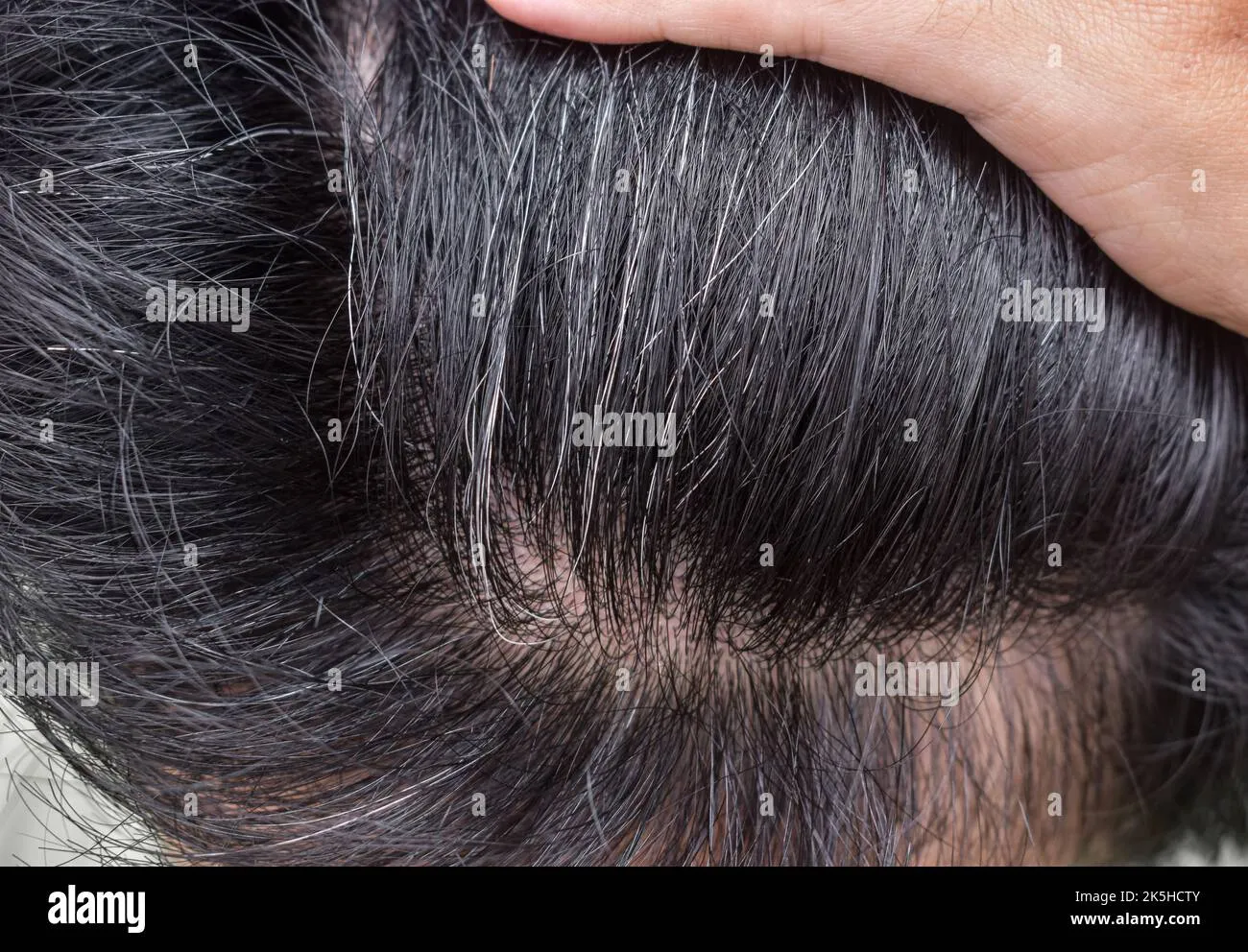Understanding Premature Hair Whitening
Premature hair whitening, or graying hair that occurs before the age of 30 (for Caucasians) or 20 (for Asians and Africans), can be a distressing experience. While graying is a natural part of aging, the early onset can raise concerns about underlying health issues and lifestyle factors. Understanding the causes of premature hair whitening is the first step towards prevention and management. This process involves a reduction in melanin production, the pigment responsible for hair color, leading to strands that appear gray or white. This phenomenon isn’t just about aesthetics it can signal underlying health issues or be a reflection of a person’s lifestyle. Addressing the root causes can not only help in maintaining the natural hair color for longer but also improve overall well-being. Several factors play a role in this, from genetics to vitamin deficiencies and environmental stressors.
What Causes Premature Hair Whitening
The causes of premature hair whitening are multifaceted, often involving a combination of genetic predisposition, lifestyle choices, and environmental factors. Identifying these causes is important for implementing effective preventative measures. The process is complex, and research continues to unveil the intricacies of hair pigmentation and its relationship to overall health. It’s important to note that while some causes are manageable, others may require professional medical attention. The following sections will delve into the key contributors to premature hair whitening, providing insights into how each factor influences hair color and offering ways to mitigate its effects.
Genetics & Family History
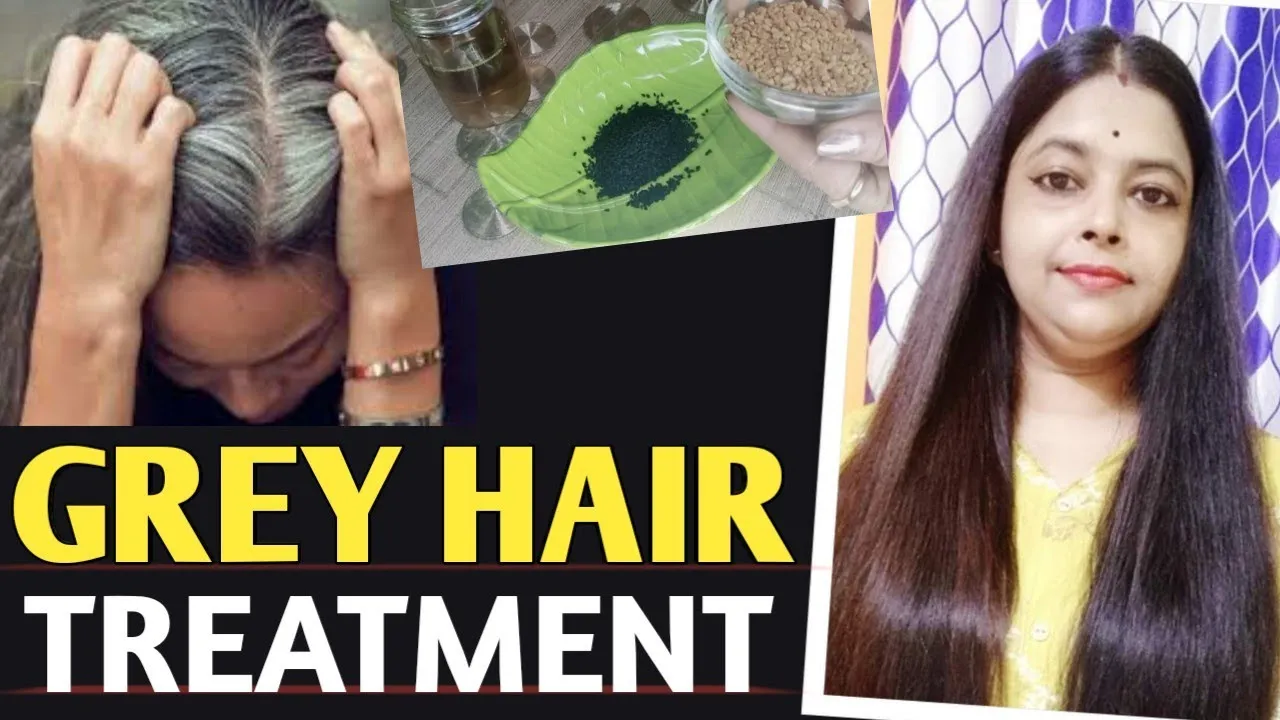
Genetics play a significant role in determining when and how quickly your hair will turn gray. If your parents or grandparents experienced early graying, there’s a higher likelihood that you will too. Family history provides valuable clues about your predisposition to this condition. This inherited trait influences the melanocyte activity and the rate at which melanin production declines. Certain ethnic groups may also have a genetic tendency towards earlier graying. For instance, Caucasians may start to gray earlier than individuals of African descent. Understanding your family history can help you anticipate the changes in your hair and take proactive steps. This awareness allows you to focus on lifestyle adjustments and preventive measures to delay or reduce the impact of premature hair whitening. The image ‘premature-hair-whitening-genetics’ could represent a family tree highlighting genetic predispositions or a close-up of different hair colors within a family.
Vitamin Deficiencies
Vitamin deficiencies can significantly contribute to premature hair whitening. Deficiencies in essential nutrients, such as vitamin B12, vitamin D, vitamin E, and biotin, have been linked to changes in hair pigmentation. These vitamins play crucial roles in maintaining healthy hair follicles and supporting melanin production. For example, vitamin B12 is vital for red blood cell formation, which carries oxygen to hair follicles; a deficiency can lead to premature graying. Similarly, vitamin D, which is obtained through sunlight exposure and diet, is essential for hair follicle cycling. Insufficient levels of these nutrients can impair hair growth and color. Addressing these deficiencies through dietary adjustments or supplements can sometimes reverse or slow down the graying process. Consulting with a healthcare provider to assess your vitamin levels is important. This is to determine if supplementation is necessary and appropriate for your specific needs. The image ‘premature-hair-whitening-diet’ could show foods rich in the necessary vitamins or a person taking a supplement.
Stress & Lifestyle
Chronic stress and unhealthy lifestyle choices can accelerate the graying process. Stress triggers the release of hormones that can negatively affect melanocyte activity. This leads to reduced melanin production and premature hair whitening. Lifestyle factors, such as smoking and excessive alcohol consumption, contribute to oxidative stress, which damages hair follicles and impairs melanin synthesis. A poor diet lacking essential nutrients and antioxidants can further exacerbate the problem. Conversely, a healthy lifestyle that includes stress management techniques, a balanced diet, and avoidance of harmful substances, supports healthy hair. This can help slow down the graying process. Integrating mindfulness practices, regular exercise, and a nutrient-rich diet can make a difference in maintaining hair color and overall health. This requires conscious effort, but the benefits can be substantial. The image ‘premature-hair-whitening-stress’ could depict someone practicing yoga or meditation, or a visual representation of the impact of stress on hair.
Medical Conditions
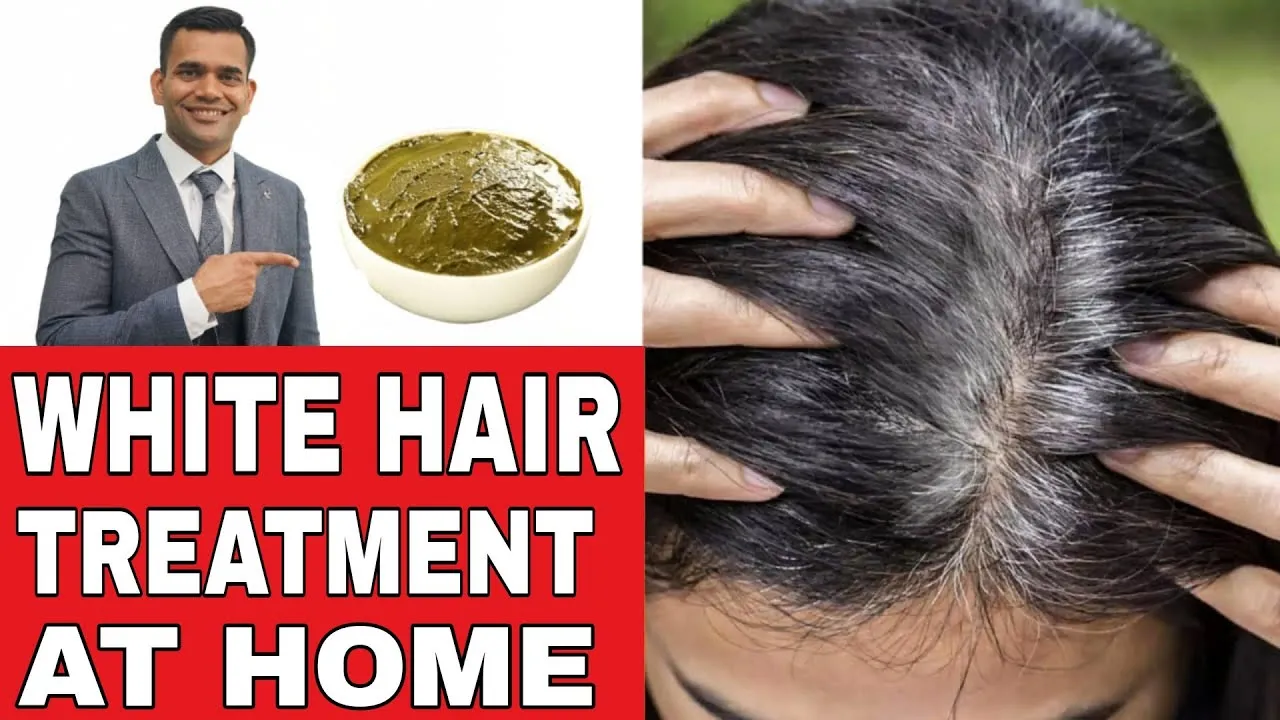
Certain medical conditions can be associated with premature hair whitening. Autoimmune diseases, such as alopecia areata and vitiligo, can affect melanocytes and lead to changes in hair pigmentation. Thyroid disorders, which affect the body’s metabolism and hormone production, may also contribute to hair graying. Additionally, conditions like pernicious anemia (caused by vitamin B12 deficiency) and Werner syndrome (a rare genetic disorder) can be linked to early graying. If you experience premature hair whitening along with other symptoms, consulting with a healthcare provider is important. This is to rule out any underlying medical issues and receive appropriate treatment. Prompt diagnosis and management of these conditions can not only address the medical concerns but also help in preserving the natural hair color. The image ‘premature-hair-whitening-doctor’ could show a consultation with a doctor or a representation of medical tests related to hair health.
How to Prevent Premature Hair Whitening
Preventing premature hair whitening involves a proactive approach to lifestyle and health. While genetics play a role, many factors are within your control. Implementing these strategies can help maintain your natural hair color for longer. It’s important to approach these methods holistically, combining dietary adjustments, stress management, and healthy habits. The goal is to support hair health from the inside out. Prevention is a continuous process, and the earlier you start, the better the results. Make informed decisions about your health and lifestyle, and consider consulting with professionals to tailor your approach to your specific needs and circumstances.
Dietary Changes
Your diet plays a pivotal role in hair health and pigmentation. Consuming a balanced diet rich in essential nutrients can provide the building blocks necessary for healthy hair follicles and melanin production. Focusing on foods packed with antioxidants, vitamins, and minerals supports the body’s ability to maintain hair color. Dietary changes can be one of the most effective preventative measures against premature hair whitening. A well-rounded diet not only helps in maintaining hair color but also supports overall health and vitality. The following sections will provide specific recommendations for dietary adjustments.
Foods Rich in Antioxidants
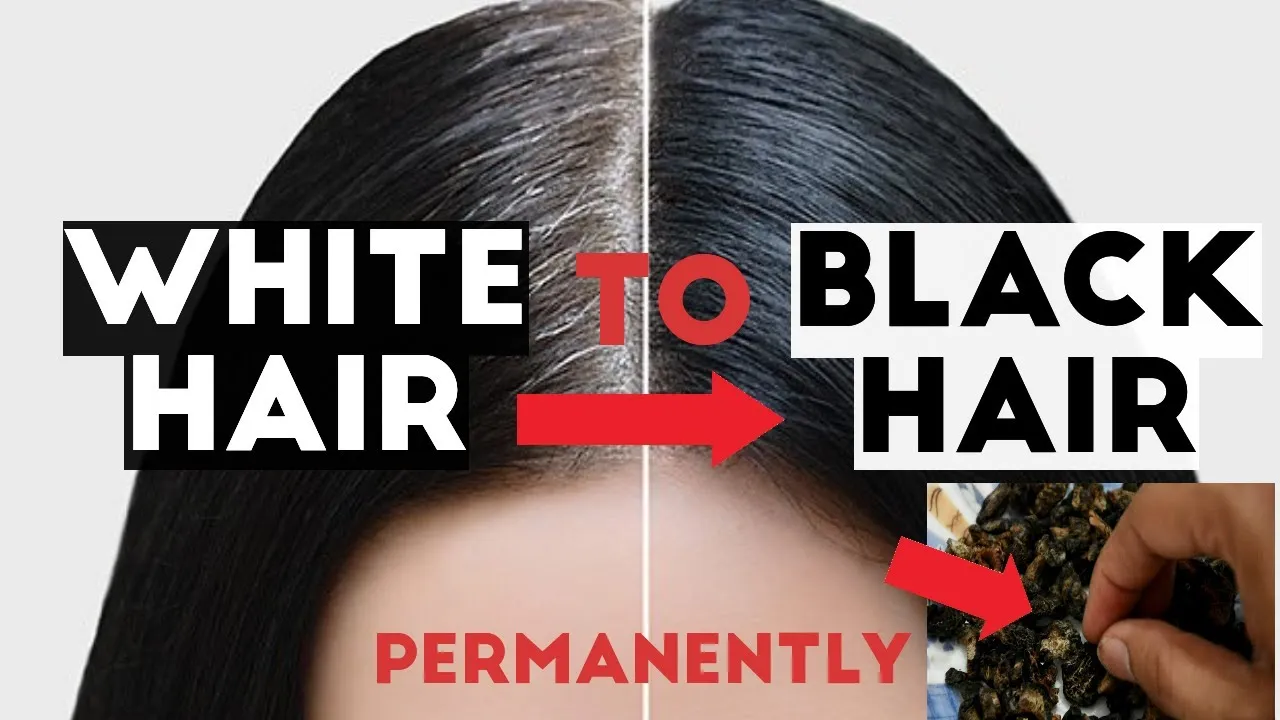
Antioxidant-rich foods help combat oxidative stress, which is a major contributor to premature graying. Oxidative stress occurs when there is an imbalance between free radicals and antioxidants in the body. This imbalance can damage cells, including those responsible for melanin production. Incorporating foods high in antioxidants into your diet can neutralize free radicals, protecting hair follicles and supporting melanin synthesis. Great sources include colorful fruits and vegetables, such as berries, spinach, kale, and bell peppers. These foods are packed with vitamins C and E, which are potent antioxidants. Drinking green tea and consuming dark chocolate (in moderation) can also boost antioxidant intake. By making these dietary choices, you are actively contributing to the health of your hair and potentially slowing down the graying process. The image ‘premature-hair-whitening-diet’ could show a colorful plate of antioxidant-rich foods.
Supplements for Hair Health
In addition to a balanced diet, certain supplements can support hair health and potentially prevent premature graying. Vitamin B12, biotin, vitamin D, and iron are key nutrients that play a crucial role in hair pigmentation and follicle health. If you have deficiencies in these areas, supplements may be beneficial. However, it’s essential to consult with a healthcare provider before starting any new supplement regimen. They can assess your individual needs through blood tests and recommend the appropriate dosage. Over-supplementation can sometimes lead to adverse effects, so personalized guidance is important. The image ‘premature-hair-whitening-supplements’ could show various supplement bottles relevant to hair health, highlighting key ingredients like biotin and B12.
Managing Stress
Stress can significantly contribute to premature hair whitening. High levels of stress can trigger the release of hormones that disrupt melanin production and damage hair follicles. Implementing effective stress management techniques is a critical step in preventing and managing premature graying. Chronic stress not only affects hair color but also impacts overall health. Prioritizing stress reduction can have a positive effect on various aspects of your well-being. There are numerous methods to manage stress, ranging from simple lifestyle changes to more structured practices.
Stress Reduction Techniques
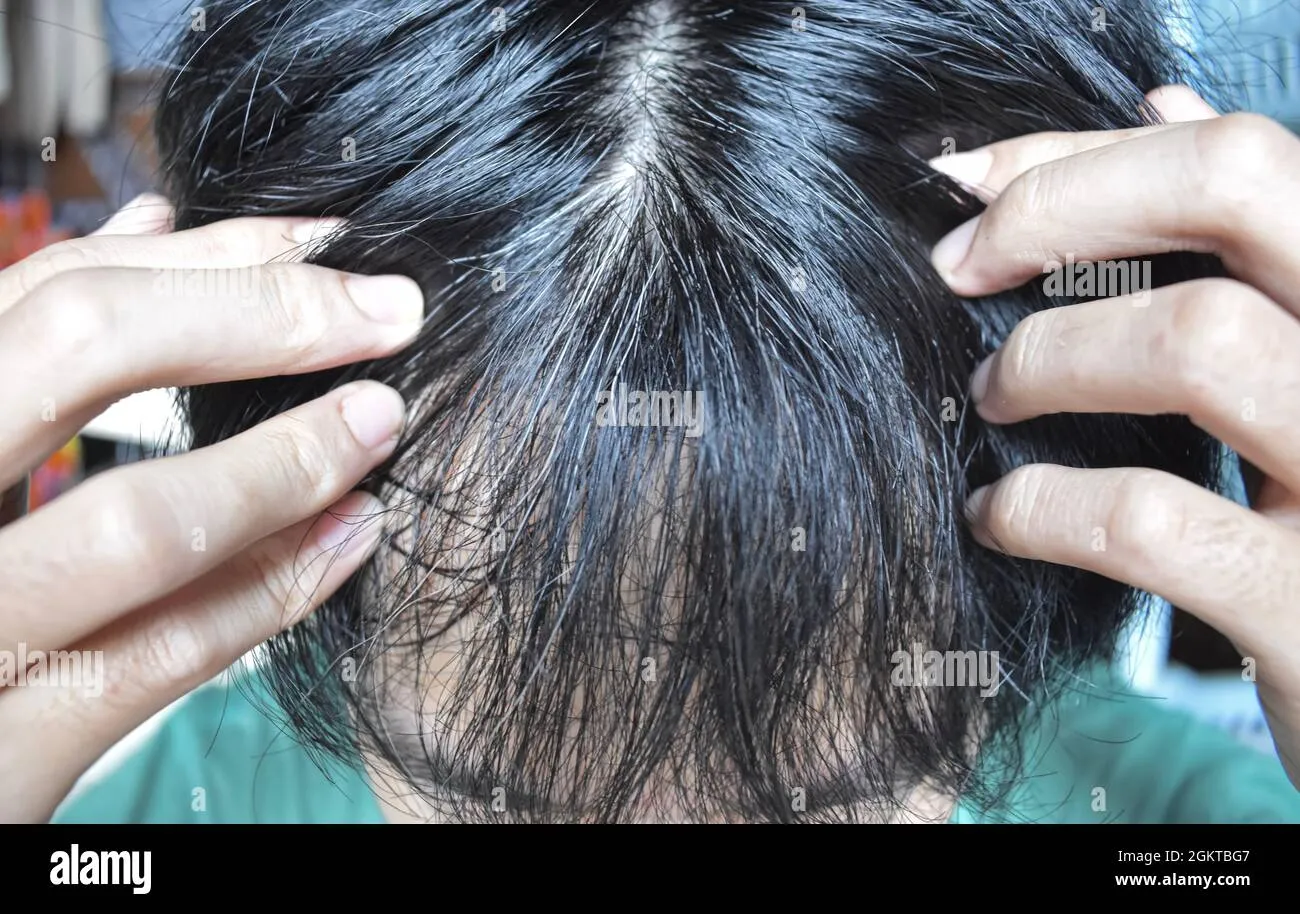
There are several effective stress reduction techniques you can incorporate into your daily routine to mitigate the effects of stress on your hair and overall health. Regular exercise, such as yoga, running, or swimming, releases endorphins and reduces stress hormones. Practicing mindfulness and meditation can help you become more aware of your thoughts and emotions, allowing you to manage stress more effectively. Engaging in hobbies and activities that you enjoy, such as reading, listening to music, or spending time in nature, can also alleviate stress. Prioritizing sleep is important, as lack of sleep can exacerbate stress levels. Aim for 7-9 hours of quality sleep per night. Consider deep breathing exercises or progressive muscle relaxation to calm your nervous system. The image ‘premature-hair-whitening-stress’ could show individuals engaged in yoga, meditation, or other relaxing activities.
Healthy Lifestyle Choices
Making healthy lifestyle choices can significantly impact your hair health and help prevent premature graying. These choices not only promote hair color retention but also improve overall well-being. This means adopting habits that support your health from the inside out. Healthy lifestyle choices are often interconnected and can create a positive feedback loop. By making conscious decisions in various areas of your life, you can effectively support hair health and reduce the risk of premature graying.
Protecting Hair from Sun & Pollution
Exposure to sunlight and environmental pollution can damage hair and accelerate the graying process. UV rays from the sun can degrade melanin, leading to fading and premature graying. Similarly, pollutants, such as smoke and other toxins, can cause oxidative stress, which also harms hair follicles. Protecting your hair from these environmental stressors is important. When you are outdoors, wear a hat or use hair products with UV protection. Wash your hair regularly to remove pollutants and prevent buildup. Consider using antioxidant-rich hair products to neutralize free radicals. By taking these precautions, you can protect your hair from environmental damage and maintain its natural color for longer. The image ‘premature-hair-whitening-sun-protection’ could show someone wearing a hat or using a hair product with UV protection.
Avoiding Harsh Chemicals
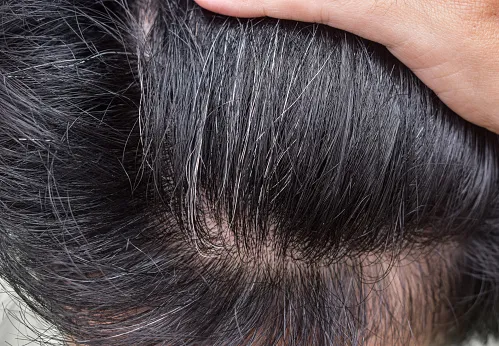
Harsh chemicals found in hair products can also damage hair and contribute to premature graying. Chemicals like sulfates, parabens, and certain dyes can strip the hair of its natural oils and damage hair follicles, which can affect melanin production. Choosing gentle, natural hair care products is a good strategy. Look for products that are free of harsh chemicals. Avoid frequent use of heat styling tools, such as hair dryers, straighteners, and curling irons, as they can also damage hair. When coloring your hair, opt for ammonia-free or low-chemical formulas. By minimizing exposure to harsh chemicals, you can protect your hair from damage and maintain its natural color. The image ‘premature-hair-whitening-chemicals’ could show a selection of natural hair care products, highlighting the absence of harmful chemicals.
When to See a Doctor
While premature hair whitening can often be managed through lifestyle changes, there are instances when it is important to consult a doctor. If you notice sudden or rapid graying, especially if it is accompanied by other symptoms, seeking medical advice is recommended. This can help rule out underlying medical conditions that may be contributing to the issue. If you suspect that vitamin deficiencies are playing a role, a healthcare provider can order blood tests to assess your levels and recommend appropriate supplementation. Additionally, if you experience hair loss, skin rashes, or other unusual symptoms, it’s essential to consult a doctor. Early diagnosis and treatment of any underlying conditions can help address the root causes of premature graying and improve your overall health. The image ‘premature-hair-whitening-doctor’ could show a consultation with a doctor or medical tests related to hair health.
In conclusion, premature hair whitening is a multifaceted issue influenced by genetics, lifestyle, and health. While graying is a natural part of aging, its early onset can be concerning. However, understanding the causes and implementing preventative measures can significantly impact hair health. Dietary adjustments, stress management, and healthy lifestyle choices are the primary strategies. Consulting with healthcare professionals and seeking appropriate medical attention when necessary is important. By taking a proactive and informed approach, you can effectively manage premature hair whitening and maintain the natural color of your hair for longer. Remember that consistency is key. Continued effort in adopting these strategies will lead to noticeable and lasting results.
